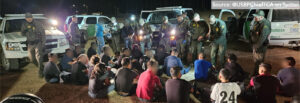Photo by Kristel Muciño
The pact below is the result of work from multiple civil society organizations in Mexico. WOLA is pleased to share in their efforts to coordinate broad-based consensus to deal with the problems of violence and impunity that are plagueing the country.
In the face of the country’s emergency situation, where civil war has erupted because of the monopoly of drug trafficking, we propose a civil society Pact that places demands on the authorities.
1- We demand truth and justice.
A. To establish the facts and investigate assassinations, kidnappings, missing persons cases, human trafficking, and other crimes that offend society; to procure justice by prosecuting the masterminds and perpetrators, the co-conspirators, and the authorities’ negligence.
To determine the identity of victims.
B. To publicly resolve emblematic cases of personal injury, bringing charges against the perpetrators, within 3 months (Reyes family, ABC Nursery, Le Baron family, the Villa de Salvarcar and Temixco youth).
C. (From civil society) To rescue the memory of victims, placing plaques with their names in public squares.
2- We demand an end to the war strategy and the espousal of a focus on citizen safety.
A. To change the militarist focus and undertake a strategy of citizen safety with a focus on human rights, which avoids the army’s participation in police tasks; to advance an alternative safety model that recuperates self-management and citizen participation.
B.I That local congresses approve the constitutional reform on human rights and that the mechanism for the protection of journalists and human rights defenders is created, within two months.
B.II That laws that violate human rights under the concept of “national security” are not approved. That laws where consensus has been reached among human rights and civil society organizations are approved.
C. (From civil society) To organize a “National Meeting” on the experiences of self-managed and community-based public safety, which are already present in the country, in order to generate alternatives to mend the social fabric.
3- We demand a fight against corruption and impunity.
A. Autonomy for the Office of the Public Prosecutor and citizen control over police and security forces. The reform of judicial power, including public hearings, and the establishment of more effective judicial control systems. Justice cannot continue to be carried out at the service of political interests and calculations.
A law to investigate and punish public officials of the three branches of government in corruption cases.
B. To eliminate immunity for legislators and public officials of the three branches of government, within 6 months.
4- We demand that the economic causes and profits of crime be combated.
A. To combat money laundering and criminals’ assets through the creation of autonomous patrimonial research units, in coordination with the Federal Financial Intelligence Unit.
B. The presentation of a “Report to the Nation” about the results of the patrimonial and money laundering investigations.
C. (From civil society) To file formal complaints about noteworthy cases of wrongfully acquired wealth, as well as instances in which resources from organized crime infiltrate political campaigns and businesses.
5- We demand that our youth receive emergency attention and that effective actions be taken to mend the social fabric.
A. Economic and social policies that generate real opportunities in education, health, culture, and employment for the youth. The recovery of education’s public character and breaking the SNTE (Teacher’s Union) elite’s corporative control over education policy.
B. A special national emergency program for youth, which will result in a higher number of students in high schools and universities, in more schools and in more scholarships for students in public schools, as well as resources for student projects.
6- We demand participative democracy, an improved representative democracy, and the democratization of media.
A. Institutional recognition of referenda, independent candidacies, recall elections, social audits, and collective actions.
To terminate the monopoly on telecommunications.
BI. The approval of the constitutional political reform that establishes referenda, legislative initiatives, independent candidacies, and the reelection of legislators and mayors.
B.II To also approve recall elections and reduce political parties’ funding.
That the law of collective actions is not restrictive and that the Federal Telecommunications and Audiovisual Contents Law, proposed by civil society and legislators from several parties, is approved.
To iniciate the path
These proposals are the beginning of a path; they are not its end.
We propose two phases to achieve this:
· a citizen Pact among the members of civil society,
· and in a second phase, a series of proposals and mandates, as well as a series of demands placed on those who govern, on political party leaders, and on the powers that be.
On June 10th, we will gather in Cd. Juárez to establish the Pact of Civil Society.
Civil Verification and Sanction Commissions will be created to evaluate the fulfillment of each point and to propose actions of civil resistance in case of unfulfillment.
With the Pact of Civil Society, we will establish a citizen mandate and we will demand a clear response from the heads of the federal and state executive powers; from political parties’ national presidents, and from coordinators of Congress factions; from the judicial power representatives, as well as representatives of the business and financial sectors; from unions, churches, and social organizations.
Moreover, we call upon our compatriots abroad and the people of the United States of America to demand that the U.S. government and its Congress stop the arms flow to Mexico, as well as money laundering.
Translated by Civic Alliance (Mexico) and Global Exchange (United States). Photo by Kristel Muciño.

